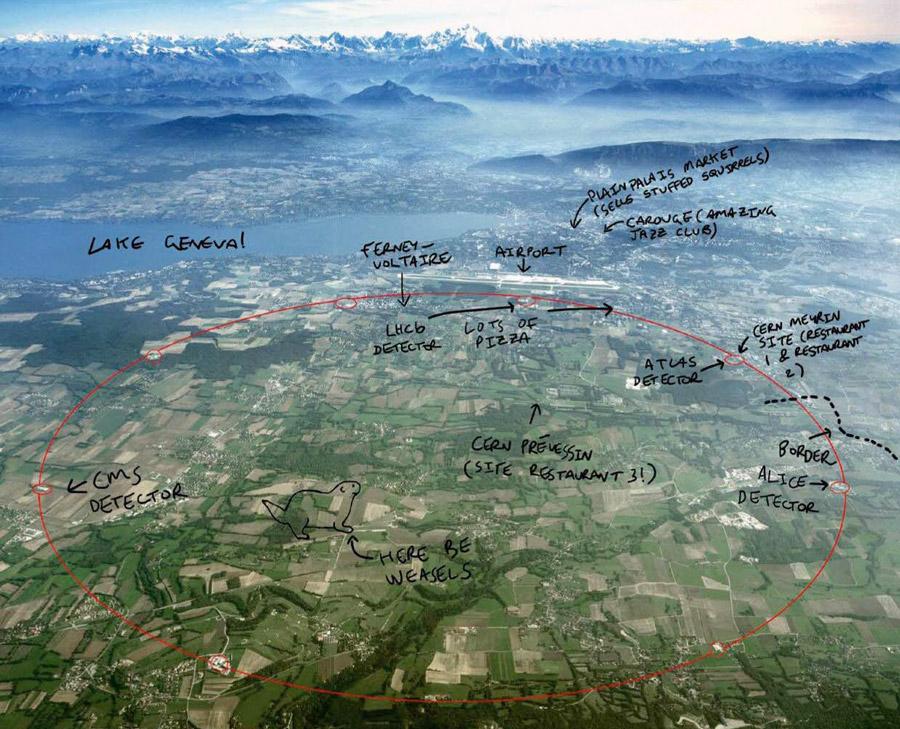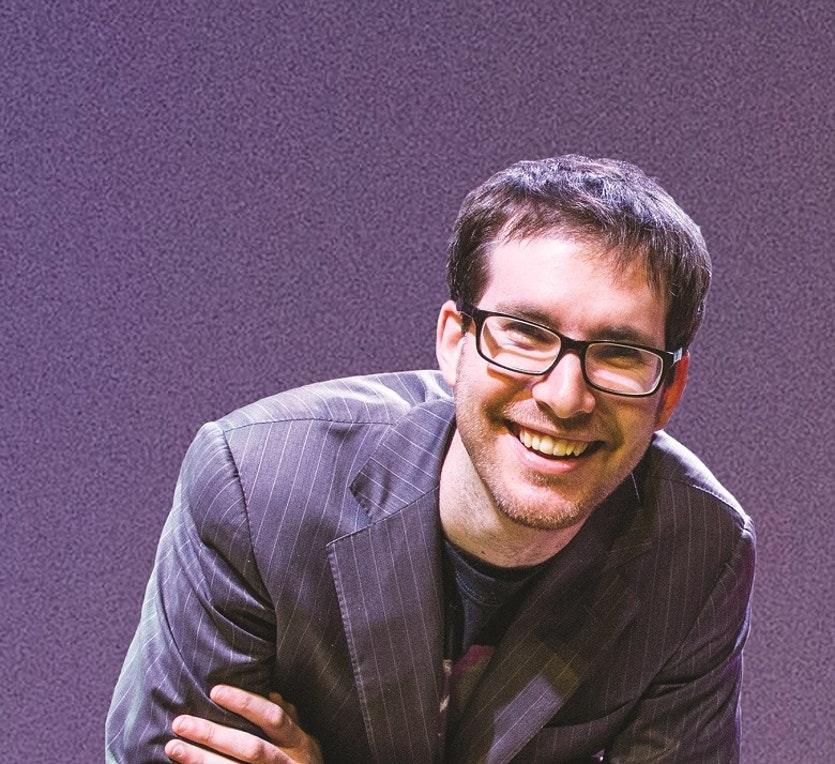Part of a disCERNing crowd
Astrophysicist Martin White discusses life with and around the Large Hadron Collider.

An aerial view of the CERN site, enlivened by Martin White’s hand-written annotations - ATLAS EXPERIMENT / CERN
View larger image
It’s lunchtime, and I am standing with a colleague under the main site of the CERN laboratory, trying to work out whether to go right or left.
With the rainy Geneva winter in full swing, he informs me that he’s found a hidden entrance to a network of tunnels under the foyer of CERN’s main building and has worked out how to get to the fabled Restaurant 2 without getting wet.
All we have to do is follow his secret route through the tunnels, which it transpires is so secret that he himself has forgotten it. After half an hour squeezing past hanging cables and scary radiation warnings, we emerge starving exactly where we started out.
This is life at CERN in a nutshell – an endless search for the unknown conducted in a spirit of frivolity by permanently hungry practitioners.
Established in 1954, the European Organisation for Nuclear Research (CERN) hosts the largest particle accelerator ever built by humankind, named, rather appropriately, the Large Hadron Collider (LHC).
It also has an ambitious and wide-ranging program of other experiments, which test various aspects of particle and nuclear physics, and develop practical spin-off applications of the cutting-edge technology required to push our understanding of the universe to deeper and deeper levels.
Having lived there on and off for many years, the question I get asked more than any other is: “What does a person at CERN actually do all day?”
I never had a typical day at CERN, since my work brought me into contact with computer scientists, civil and electrical engineers, medical physicists, theoretical physicists, accelerator experts, and detector physicists.
The only common thread was attendance at a large number of meetings which, when located at opposite ends of the main site, led to frantic daily runs of a few kilometres that contributed to a significant weight loss – until I discovered the CERN cake selection.
The preferred language is English, but it’s not easy to recognise it as such, due to a heavy reliance on jargon and acronyms.

"I met physicists who could answer me in English, before translating for an Italian colleague, and mocking my question in German to a bystander."Associate Professor Martin White - proudly part of 'an endless search for the unknown'. Photo by Glenn Hunt
Nevertheless, I am always surprised at how quickly the exotic becomes normalised at CERN, whether that means getting acclimatised to constantly being surrounded by extraordinarily smart people or becoming used to dinner party statements like “I have a terrible day tomorrow – I have to reassemble the positron accumulator!”
My work at CERN has involved the ATLAS experiment, one of the seven experiments of the LHC whose job is to filter and record the results of proton-proton collisions that occur more than one billion times a second.
The middle of this detector is effectively a giant digital camera, consisting of 6.3 million strips of silicon, and my first job at CERN was to write the software that monitored each of these strips individually to confirm that the system was operating smoothly.
I am one of CERN’s 12,000 users, and like most of them I have worked for various universities and research institutes scattered around the world, with frequent travel to the CERN laboratory as an external participant.
The intense lure of CERN is that it remains the best international facility for discovering the new particles and laws of nature that would explain both how the Universe works on its smallest scales, and how it operated 0.0000000001 seconds after the Big Bang.
The Standard Model of particle physics that I learnt as an undergraduate, and now pass on to my students, remains incapable of explaining most of the matter in the Universe, and it is widely believed that the LHC will finally shift us to a higher plane of understanding.
About this article
Associate Professor Martin White is a particle astrophysicist in our School of Physical Sciences and ARC Centre of Excellence for Dark Matter Particle Physics. As a member of the ATLAS experiment, he searches for supersymmetric particles and new Higgs-like particles.
This is an edited excerpt from the article 'A disCERNing crowd', which appears in edition 85 of Cosmos magazine. The excerpt is republished with permission.
